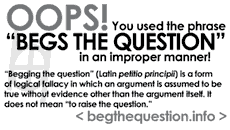“Get Off Your Knees, Stop Clasping Your Hands, and Read Some Aristotle, Ya Knucklesuckers”
I am an English teacher, so I get to be crabby. That, along with wearing intimidating glasses, is part of my job.
What’s more, it’s not enough just to be crusty; fundamental to the profile of English Teacher is the need to wail like Ginsberg reading “The Howl,” pull at our restrictive French knots, and gnash our coffee-stained teeth when anyone *dares* to violate any of a myriad of complex, even unintelligible, rules.
A misused apostrophe elicits from us a snorted “harrumph.” My harrumphs have occasionally become so forceful that they have propelled my hand into my pocket, where a ballpoint pen awaits, ready to take corrective measures. Indeed, there is a small museum in Iowa that once drew my apostrophic ire when it had the gall to display a sign–to all the corn-fed public who could scrape together the $4.00 admission fee from that week’s pig sales–reading, “This tractor was removed from operation after mangling it’s owner’s hand one sweltering July when he reached down for a sip of lemonade out of his Mason jar, slipped, and was ground under the wheels.”
If you look closely enough at this sign, you will see that a ballpoint pen, wielded with rage, scratched out the offending apostrophe, leaving a more appropriate “its” in it’s (er, its) wake.
So, yea, I can get pissy about apostrophes. (one caveat: I don’t care what anyone does in casual writing; that’s the domain of exploration, willful sloppiness, and sentence boundary romps…I’m just referring to formal, for-scrutiny language here)
Don’t even get me started on comma splices, run-ons, and fragments: The Triad of Evil. If I had fewer students and didn’t read several thousand papers each year, I’m sure I wouldn’t be prostrate in my office three times a week, moaning as I lie under my rolling chair, “For the love of Strunk and White, use a friggin’ verb. ” My agony is so extensive that I once offered a student my father’s watch fob if only, if oooonly, she would use a noun. Just once. Having recently pawned her pocket watch, her counter offer was to cut off all her hair and ask me if I could purchase her a new set of tortoise shell hair combs instead. With the ironic stakes thusly agreed upon, she did, in fact, use a noun in one of her papers.
It was “brick.” How very disappointing. I was hoping for, at the least, “manta ray”…or maybe even “unicycle.” Or how about “indigence”? Give me something here, my dear knothead.
And if you really want to see me get revved up, try misusing “less” and “fewer.” Moreover, I’ve been known to pull out strands of hair over the confusion of nominative and objective forms of pronouns (he/him, she/her), especially when such confusion occurs at the end of a prepositional phrase, when the speaker or writer uses the nominative form in an effort to sound hyper-correct: “Just between you and I, the butler has been stealing the silver to finance his meth addiction.” Pullease, Madame Voyeur, give me a “just between you and me” before I toss your wallet, and your diamond chip earrings, into the butler’s homemade pipe.
Indeed, although my bathtub hasn’t had a scouring in four months, I am a stickler when it comes to linguistic correctness.
So you can imagine my distress over the burgeoning “Beg the Question” misuse trend. Here’s the deal: every time I attend some sort of professional training or pick up a magazine, I see this phrase used wrongly. The term “beg the question” refers to a logical fallacy–an error in creating an argument–wherein the arguer takes for granted the thing that he/she is attempting to prove. To wit: “Helen Mirren is clearly an attractive older woman because she’s so striking.” Um, yea. Got that. I saw her breasts at the Oscars. They still had attitude. Thus, if one “begs the question,” one puts out a circular argument, neatly sidestepping any true reasoning.
However, nowadays, in this age of drive-thrus and Blockbuster and cell phone family plans, many of our finer principles have been bastardized, including, tragically, “begging the question.” Several times each week, I hear or read this phrase being used in the sense of “raising the question.” For example, “Since we have no more Little Debbies in the house, it begs the question of when we’re going to go shopping.”
Snarl. Don’t. Even. Beg. Your. Damn. Question. That. Way. You. Poop. Chute.
My pathology runs so deep that last week I snapped at a student who, woe for him, raised his hand and uttered the words, “Beg your pardon, Jocelyn. I have a question.”
I heard those words in close proximity to each other and went, not “postal,” but “English Teacher” on him. It was bloody; it involved forty whacks; and when I regained my senses, I was holding a splintered ruler and an empty stapler.
————————————————
Anyone have fifty cents so I can call my husband and have him come bail me out of this holding cell? That tough guy in the corner didn’t really cotton to me when I corrected the spelling of his “Bonz and Grillz” tattoo. In fact, he’s got a shiv (ooh, vocabulary enrichment!) held to my jugular right now.
All the unsplit infinitives in the world can’t save me now.


Leave a Reply